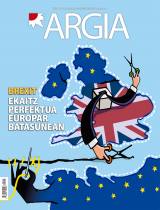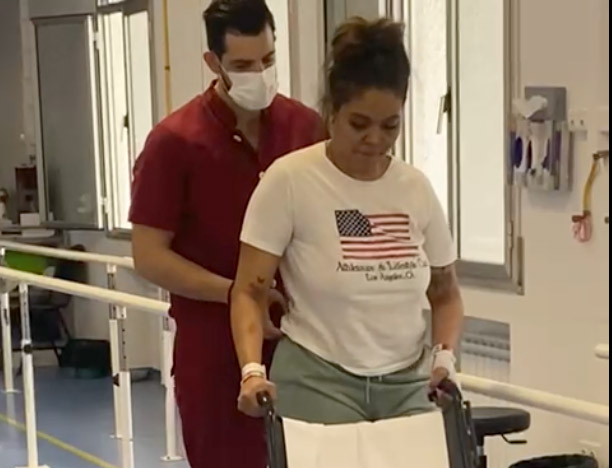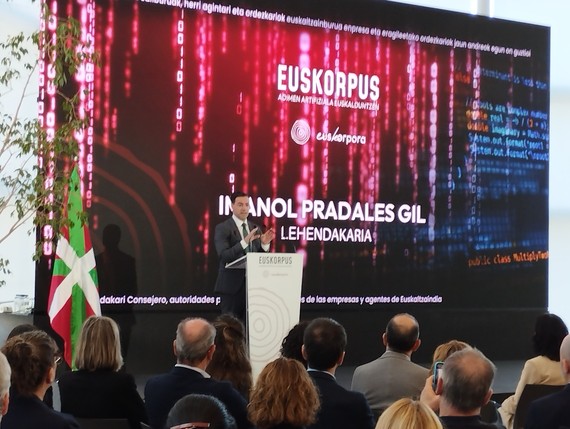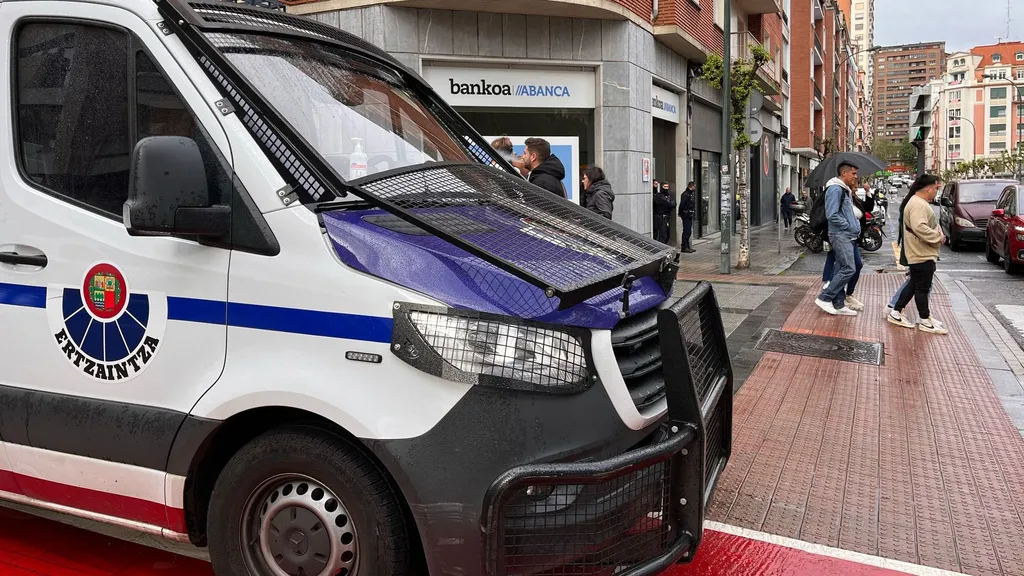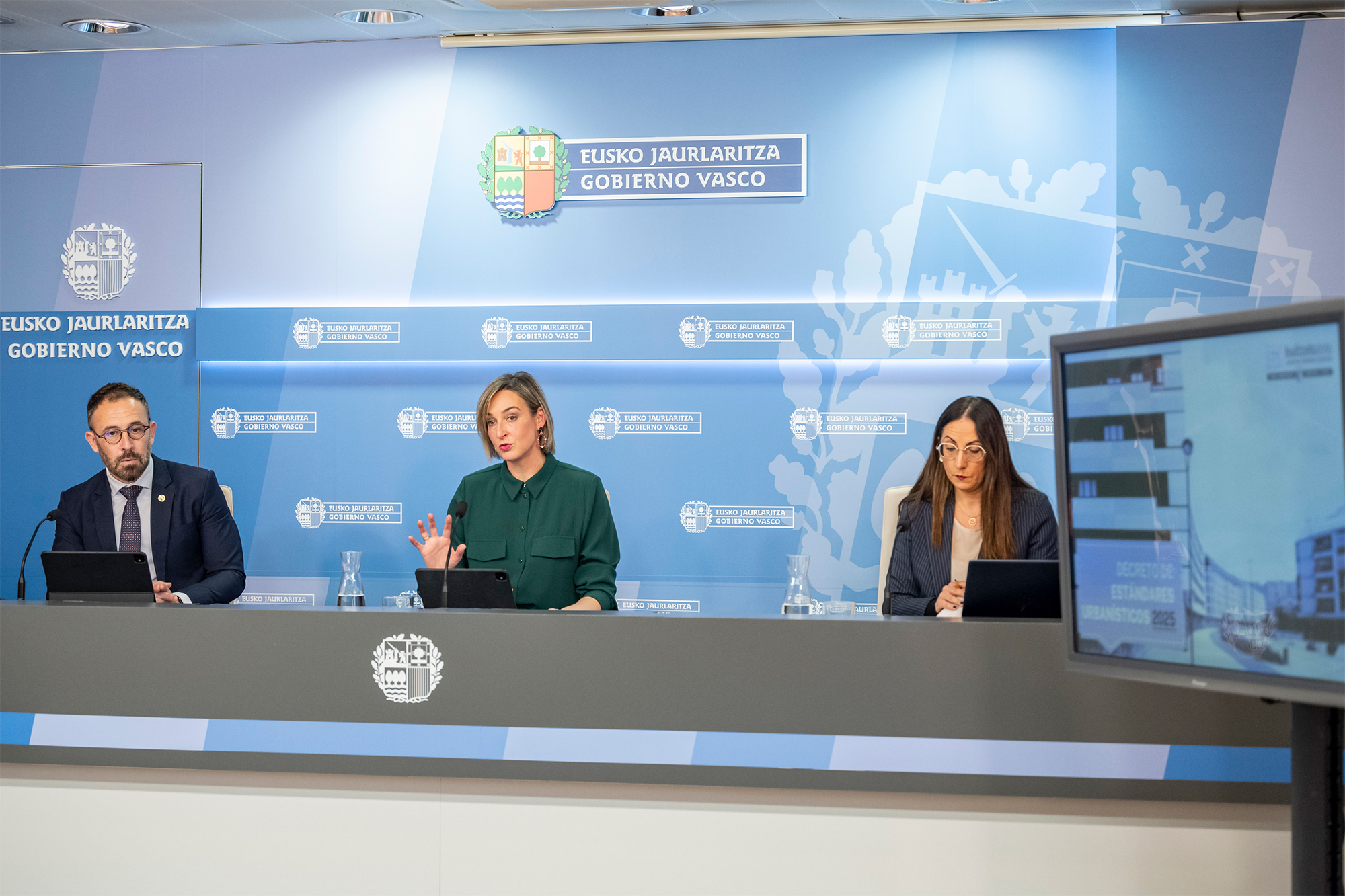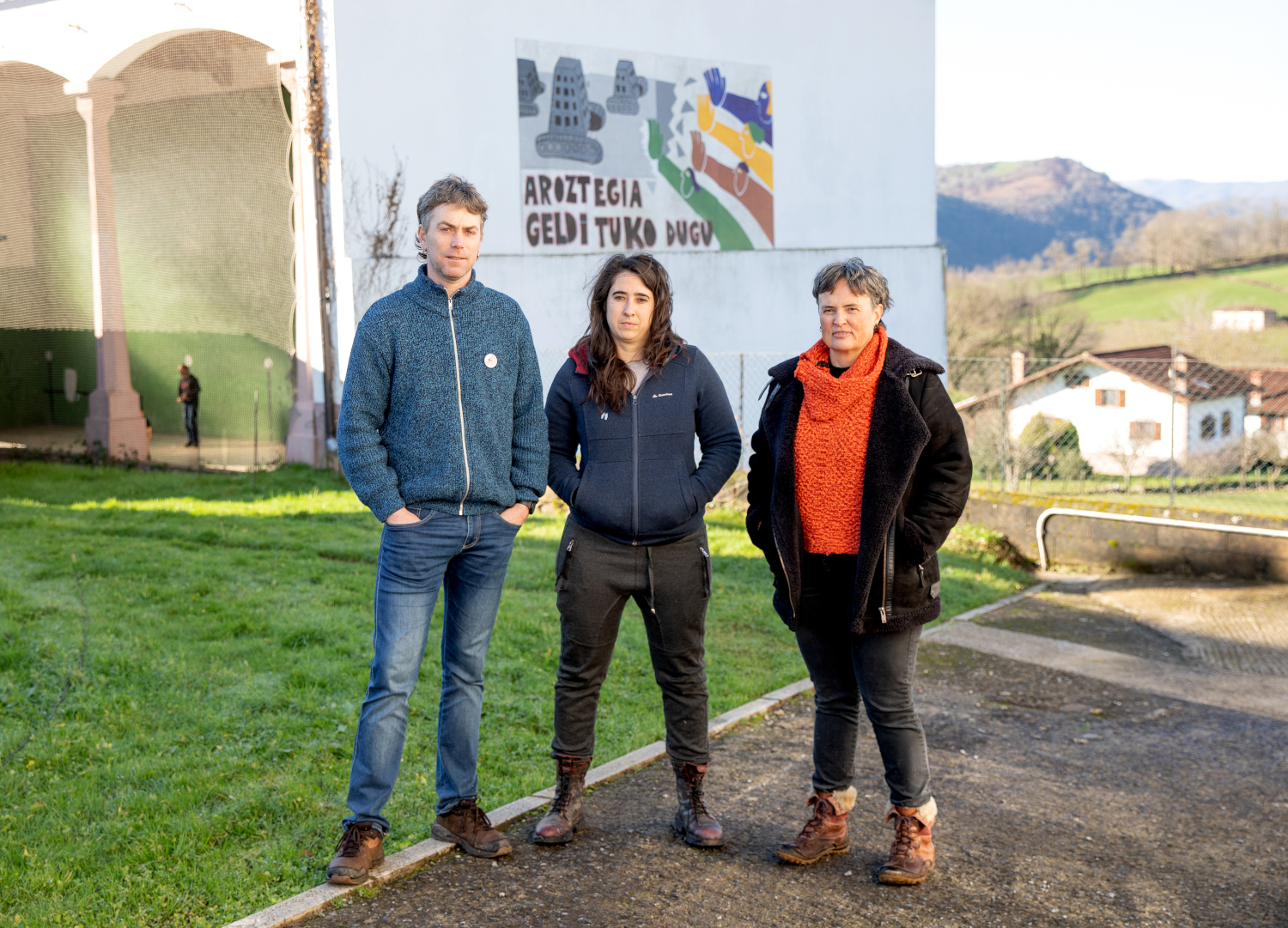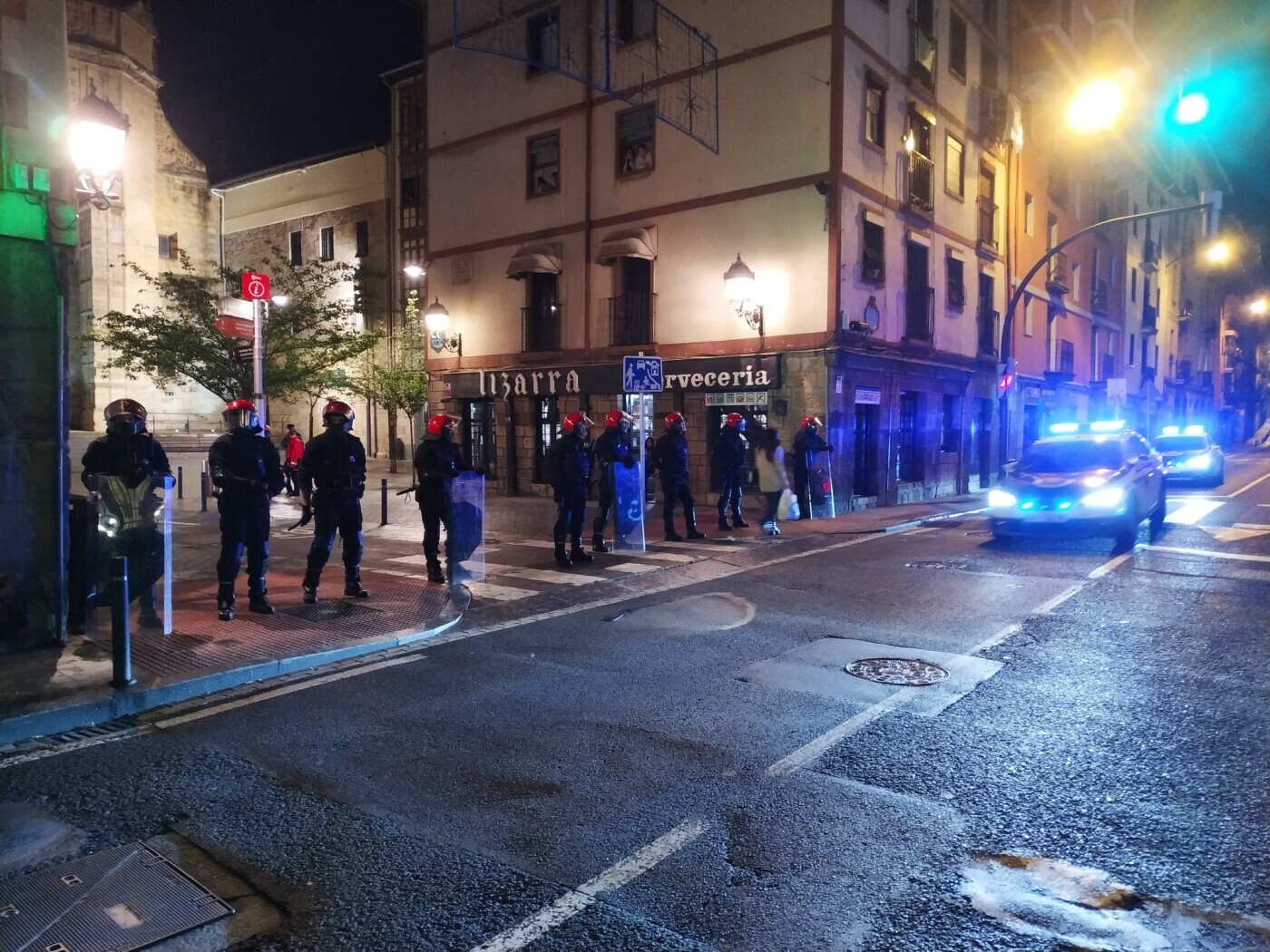"The radicality of our struggle has been very artificial."
- Pasaia 1957. It's been 35 years since the people left. He was 16 years in hiding and 19 years in jail: “For those who have been imprisoned it is a huge effort to put myself in front of the media, it gives me no pleasure,” says the former ETA member. He spoke to us motivated by his dedication to the prisoners and by his commitment to their people. The writer takes as a starting point the book Langraiz bisean bis (Erein) by journalist Humberto Unzueta Kareaga, who is entitled 'face to face' with the dissent of ETA.
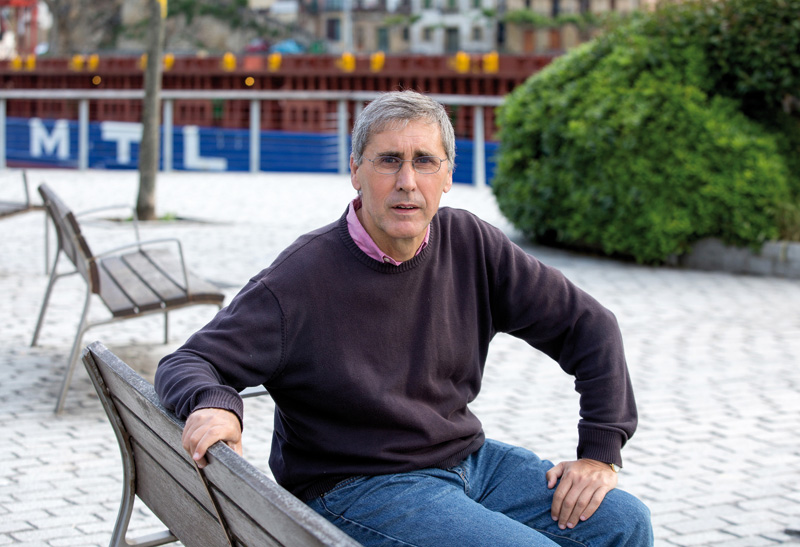
The so-called Via Nanclares belongs to a minority of prisoners. Why has it not come together?
Those of us who have chosen this path have been in different jails, old prisoners and new ones. Back in the 1980s, many prisoners criticized ETA's path, and even some of them were much more demanding than the ones we finally chose the Nanclares route. However, the way to approach these criticisms has been a big problem. In jail you have no other way than the Collective [EPPK]. Let's do a calculation. How many people are still in politics after they go out into the street? Most people do their lives, they go to some manifestation and period. In other words, individual freedom is recognized abroad, but the prisoner is not recognized; inside there is no right to decide. The prisoner has been asked to “decide” within rigid and rigorous parameters. Leaving the collective is very difficult. Once you've left, you're left without a lawyer and no help. You lose the environment you've had until then.
We therefore need great courage.
Yes. You need a lot of courage to put your position in the Collective. And not only to say “I abandon the collective and I make my own way”. To propose other ways in.
It says that the character of the collective is rigid and demanding.
Yes. The prisoner is completely limited. Due to the mentality that exists in the collective and the pressure that is generated in the environment, it is impossible for people to take steps along the path of legality. Decisions have always been made collectively, you lose your personal decision.
“In the face of ETA’s dissent,” wrote Humberto Unzueta. Has there been dissent in ETA?
Being dissident -- it's not easy. In our case, it was hard for everyone to speak out naturally. Yes, the opinion can be raised, but if what is proposed is to change the activity until then, it quickly collides with “top” and problems arise. He hasn't been alone in ETA. In these types of organizations it is accepted to abandon the organization: because you are tired, because you want to live with your family, because you want to go to the other side of the sea… Those tendencies are understood. That is, “the hard ones follow, because the others cannot.” That conviction has taken hold. The point is that there is no single reason or dissident attitude, each militant has his own opinion.
Unzueta has also underlined the plurality of the prisoners of Nanclares de la Oca.
The positions we met in Nanclares were different. Some saw the solution personally, and that is respectable. For others, including me, the Nanclares pathway is the continuation of militancy. In militancy, we make some decisions, and now also, because our responsibility is to make political contributions. When we were critical, we did not intend to do so by legal means, that is, to leave prison as soon as possible and at a point. No. In our opinion, the fundamental thing was that we should make a deep reflection in the Collective, and also in the Abertzale left, because we saw the need to end the armed struggle.
Why did it not increase the critical attitude towards armed struggle in prisons?
For example, Nelson Mandela has been mentioned on numerous occasions. Mandela in his biography says: “We tried to function as a collective, but in practice there was no collective, which prevented the prison itself.” It was Mandela himself who decided to contact the Government on his own, although he knew that he could not do so according to the group of prisoners. And he did it without consulting the prisoners who followed him. He started contacting those in charge of the jail, and that was taboo. His group said that “we have to negotiate with the government.” Mandela did not see the possibility of negotiating anything as a collective. The same has happened to us, too, and as he has done, we have taken our steps.
Arnaldo Otegi and Mandela have been matched on several occasions. Interview from the prison in Logroño: “Our enemies are in Spain, not in Nanclares,” he said on these pages.
Otegi has made such statements and sent similar messages personally to several inmates at the Nanclares de la Oca prison. These kinds of details have been very important. But there has been no such thing as Mandela among us. The situation in South Africa and the role played by Mandela have had nothing to do with the one here. Mandela took steps in jail to solve the problem, personally accepted the living conditions surrounding him: Similar to grade 3. Get out of jail. Unfortunately, there has been no such thing here.
What do you think of the EPPK trajectory?
It has wanted to function as a collective, but it has not. The collective must be a framework for expressing the opinion of the prisoners, but in practice it is a decision of the few. Decisions, generally taken abroad, are taken by former prisoners, including lawyers. Former managers of Managers. These have on many occasions paralysed the initiatives of the prisoners or have established dynamics such as hunger strikes, lockdowns, etc. And most of them have been raised from the outside.
Yoyes's was a terrible blow. However, in ETA not
everything has been black
and white
What conclusion did you draw from the evolution of ETA’s armed struggle?
One of my consequences is the negative, the mindset that has created the practice of armed struggle. Initiatives such as participation or internal democracy, in principle left-wing values, have not been worked out. However, through this mindset, the organization became an objective. The objective has been and is the continuity of the organization. Those of our time had responsibility and commitment, but we realized that our contradictions began to emerge. As from 1985 we realized that the reform was being consolidated, whether we like it or not. In the negotiations in Algeria, the opportunity for an orderly and dignified end was lost.
From then on, a new stage of ETA began. Do you think ETA’s activity changed?
Those of our time always try to combat specific goals and people. They were responsible for the repression that Euskal Herria lived, those were the objectives of the organization. What's happening is, at those initial values, a blur began to occur. For example, the actions that polymilis did against politicians were done by us – very badly valued among us –. It was a way of hiding our weakness, of giving the impression that we still had strength, of moving forward. Since then, politicians have become an objective, because politicians are also in charge of repression. These were never objective, but there was this beating. Goals were set, as well as politicians, journalists, judges… But this was not the result of the organization’s political or military analysis, but was the result of a mentality that inevitably arose to move forward. In other words, the ability to carry out actions of the past was lost and this mentality spread. This mentality has justified what was previously impossible to justify. But it is even more serious, because this mentality has spread and has been justified around the Abertzale left. Later, I read in the press “to establish the socialization of suffering” from Oldaratz’s report, “it is not possible, I cannot believe that this is how one can think”.
You are politically critical, but you have also reflected on ethics.
Yes. Because we put fundamental values upside down to achieve our political objectives. I have always been against punitive death, but we have applied it. The question is: What do we think about it today? Today’s generations should not be told “armed struggle yes or no”. On the contrary, the people we have worked on, we have to talk about the contradictions and mentality that arise in this activity.
For some it is to regret what you have done. You become a traitor.
I've never used the word repentance when talking about myself. I use the word self-criticism.
What is self-criticism?
I went into the organization, into the environments and values that I lived in, and I thought the armed struggle was legitimate. I committed myself, especially because I couldn’t “drift.” For me it was unimaginable to be in favor of the cause of Euskal Herria and hide me: “If you have to, I also have to be prepared.” Today we have to look back and make a critical view of what we have done and how we have done it. This responsibility is part of our values, which are key to the future. That's self-criticism.
We have accepted the options that were legally, we have not accepted all the conditions imposed by the government. Sortu passed all the legislation to pass its statutes, all the law of political parties.
“You have to leave ETA more courageous than entering ETA,” said Carmen Gisasola on these ARGIA pages.
Yes. To say that twenty years ago armed struggle had to end within the organization or in prison was very difficult. But you have two options: callas or reflections to be consistent with what you think. When we were inside, not only did we have to end the armed struggle, but I was very conscious that doing by legal means was important, for example, asking permission to leave. The collective said no. “How will you return to jail after you leave?” Why not? They were leaving Ireland normally. For example, at Christmas. The imposed mindset has paralysed this path.
Is it possible that there has been a misunderstanding altruism?
The radicality of our struggle has been very artificial. We were aware that we could lose our lives, but the fact that “I am willing to give everything” is not true. We became militants for one cause and gave what we could, but no one here has been willing to give life. Here has been, for example, the son of Itziar, who says the song: “Itziar’s son does not denounce any friends...” That is, it stands firm before its enemies. But the reality has been different. In the face of torture, it is difficult not to denounce anyone. The mystification has been terrible, the reality has taught us something else.
Lawyer Iñigo Iruin has analysed the “emergency penitentiary legislation” that Spain has applied to Basque prisoners. It proposes to propose a legal struggle to Law 7/2003. It says that confrontation is necessary in the legal field. The EPPK has to decide.
Iruin has made the strictest interpretation of the law that has been made public. In other words, in this situation or political parameter one cannot take a step, that law must be changed or it must be dealt with legally in order to be able to amend the law. In the meantime, however, there is a possibility of releasing a number of prisoners. There are many prisoners condemned to the legislative changes of 2003 and there is scope for legal action. If the worst interpretation is made, there seems to be no way. It is the reading proposed by some sectors of the State, the worst. It's curious that the Abertzale left does too. What Irun is now proposing is something we have long done: asking for permits. The prisoners at Nanclares de la Oca have left in the third grade of unconditional prison. We are told that the road is dead and they are going to tear it apart. For example, that the French penalty should be taken into account in Spain was obtained after the appeal we brought to the Supreme Court. If this law was in place since 2008, why wasn't anything done until 2013? Why was the legal approach not worked when the socialist party was in the Spanish Government?
“We are going to make use of the law, but not under the conditions of the Nanclares,” you can say.
We have accepted the options that were legally, we have not accepted all the conditions imposed by the government. Sortu passed all the legislation to pass its statutes, all the law of political parties. The legalisation of sortu is written in the report, in 2011, “as active delegitimisation agents of ETA”. Not only ETA, but also its militants. In particular, the report notes that ETA’s acts are terrorist in nature. If all of this were put in its parameters, today many prisoners would be at home.
One sector, called ATA, claims amnesty.
They say that those of the Sortu are traitors, because they have swallowed all the legality, so that, in the end, they are not in jail. I do not give it any importance. Of course, the last imprisoned militants have a very bad situation. With the new law of 2003, judges must serve a 40-year prison sentence. Even if prison benefits are recognised, some have to be 32 years old, and that is very difficult to change legally. Today, to claim amnesty is to claim the struggle carried as a value. And, unfortunately, it's out of place. Amnesty is not going to happen in legal terms, society is not in that dynamic. At present, it is logical to make self-criticism of what has happened and that ETA should disappear as soon as possible. The institution is nothing more than a burden on prisoners and for a standardised policy. Some say that “we have no doubt about what we have done, we don’t have to value anything.” Is that your contribution to society? For example, Yoy's, aren't you going to question it?
When they killed him, you were in ETA.
I was in the institution, I knew it could happen. I didn't want that. I was very clear that it was his personal choice and that he had the opportunity to return legally, that it was his right. Not only in your case, but in all the previous cases, I agreed, I discussed, but it was in vain. Yoyes's was a terrible blow. However, in ETA not everything has been black and white.
ETA is an unburied dead body and they don't know how to bury it. As long as this is not done, ETA is a burden on prisoners
Has the Basque Government sent a letter to prisoners about prison benefits? Will there be more prisoners on your route?
The proposals are fine, but the EPPK is opposed. What does the collective propose? For in practice, the full sentence is served. Two years ago, the Collective of Prisoners of the Church of Santa Maria said it was going to open a legal path. Despite what Iruin has proposed, time goes by and still does nothing. Five years ago, however, Sortu already approved all the legality. That is a tremendous contradiction. As for the Nanclares route, they say it's dead. Where is your way? Always disregard the proposals and the steps others take. What do you propose to the relatives of the prisoners?
You mentioned the disappearance of ETA, but it is argued that it must first be the disarmament of the organisation. It does not seem easy to take steps forward.
Yes, on the one hand, as they say: “ETA cannot disappear while prisoners are in jail.” That doesn't make much sense. A few who remain on behalf of ETA today do not represent ETA what has been in the past. Today, several former ETA militants represent ETA and it is they who manage the situation of prisoners. Whether or not to grant disarmament is depreciated. After disarming ETA, nothing will change. If I were to say that it has disappeared, the step would be symbolic. ETA is not going to make political contributions. This is over. ETA is an unburied dead body and they don't know how to bury it. As long as this is not done, ETA is a burden on the prisoners. To take steps in legality, you have to move away from being a member of ETA or the Collective, but staying out of those decisions is difficult for the prisoner. The prisoner does not take place. If, on the contrary, the organization disappears, if, after critical reflection, the Abertzale left also endorses it, the prisoner will also be able to follow his path in these new parameters, to begin with he will be better placed. After that, the real contribution that prisoners and exiles can make is the work for coexistence. That will bring about political normalization in the people. This environment will help to channel and improve the situation of prisoners legally sentenced for years in prison. There is no other solution.
Sare Herritarrak antolatuta, pasa den urtarrilaren 11n Bilboko kaleak bete zituen manifestazio jendetsuaren ondoren, berriz sortu da eztabaida, euskal presoei salbuespen legeriarik aplikatzen ote zaion. Gure iritzia azaltzen saiatuko gara.
Espetxe politikan aldaketa nabarmena... [+]
Karen Daniela Ágredok dioenez, atxilotu zutenean berak ez zuen ertzainik zauritu, haiek lurrera bota zuten eta konortea galdu zuen. Ondoren, Ertzaintzaren komisariaren zoruan iratzartu zen eta handik ospitalera eraman zuten.
11 doctors in health care earn 230,000 euros each year, one of the practices 18,000 euros
This Thursday, EH Bila asked the Government of Navarre to investigate and correct this situation in the plenary session of the Parliament of Navarre. The UPN and the PP have joined the... [+]
At the beginning of the month he did III. Congress in Pamplona. It is said to be the “ordinary congress” that serves to draw “non-ordinary conclusions”, or at least that is how they have received Zutunik in the paper, proposed by the leadership and unanimously approved... [+]
Ilbeltzeko igande goiz batez jo dugu Baztanera. Eguzkiak oraindik ez du Lekarozko plaza argitu; bertan elkartu gara Garbiñe Elizegi Narbarte, Itziar Torres Letona eta Ernesto Prat Urzainkirekin. Itzaletan hotz egiten du eta umorez goxatu dugu lehen agurra, hogei urtean... [+]
For almost a century, there has been no generation in the Basque Country that has not known torture. There are 5,379 people officially since 1960, but there are many more, because appearing publicly as tortured still hurts. And probably because nothing has changed at the base... [+]









